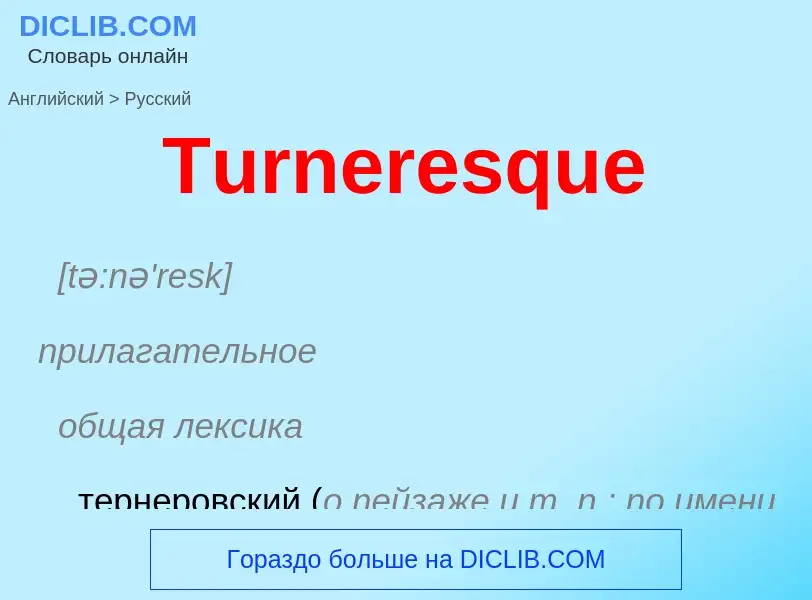Traducción y análisis de palabras por inteligencia artificial ChatGPT
En esta página puede obtener un análisis detallado de una palabra o frase, producido utilizando la mejor tecnología de inteligencia artificial hasta la fecha:
- cómo se usa la palabra
- frecuencia de uso
- se utiliza con más frecuencia en el habla oral o escrita
- opciones de traducción
- ejemplos de uso (varias frases con traducción)
- etimología
Turner V - traducción al
[tə:nə'resk]
прилагательное
общая лексика
тернеровский (о пейзаже и т. п.; по имени английского живописца XVIII - XIX вв. Джозефа Тернера)
существительное
общая лексика
стих
стихотворная строка
Латинский язык
смотри, см.
синоним
Definición
Wikipedia
Turner Broadcasting v. Federal Communications Commission, 512 U.S. 622 (1994), is the first of two United States Supreme Court cases dealing with the must-carry rules imposed on cable television companies. Turner Broadcasting v. Federal Communications Commission (II), 520 U.S. 180 (1997) was the second. Turner I established that cable television companies were indeed First Amendment speakers but didn't decide whether the federal regulation of their speech infringed upon their speech rights. In Turner II the court decided that the must-carry provisions were constitutional.
Under the Miami Herald v. Tornillo case, it was unconstitutional to force a newspaper to run a story the editors would not have included absent a government statute because it was compelled speech which could not pass the strict scrutiny of a compelling state interest being achieved with the least restrictive means necessary to achieve the state interest. However, under the rule of Red Lion Broadcasting Co. v. FCC the High Court held that a federal agency could regulate broadcast stations (TV and radio) with far greater discretion. In order for federal agency regulation of broadcast media to pass constitutional muster, it need only serve an important state interest and need not narrowly tailor its regulation to the least restrictive means.


![Maiden Lane]] where Turner was born, {{circa}}1850s Maiden Lane]] where Turner was born, {{circa}}1850s](https://commons.wikimedia.org/wiki/Special:FilePath/DV307 no.70 House where Turner was born, from a print.png?width=200)
![''[[Modern Rome – Campo Vaccino]]'', 1839 ''[[Modern Rome – Campo Vaccino]]'', 1839](https://commons.wikimedia.org/wiki/Special:FilePath/Joseph Mallord William Turner (British - Modern Rome-Campo Vaccino - Google Art Project.jpg?width=200)
![''[[Fishermen at Sea]]'', exhibited in 1796 was the first oil painting exhibited by Turner at the Royal Academy. ''[[Fishermen at Sea]]'', exhibited in 1796 was the first oil painting exhibited by Turner at the Royal Academy.](https://commons.wikimedia.org/wiki/Special:FilePath/Joseph Mallord William Turner - Fishermen at Sea - Google Art Project.jpg?width=200)
![Linnell]] (1838) Linnell]] (1838)](https://commons.wikimedia.org/wiki/Special:FilePath/Linnell - J.M.W. Turner.jpg?width=200)
![Charles Turner]], {{circa}}1840, ''Portrait of J. M. W. Turner, making his sketch for the celebrated picture of 'Mercury & Argus' ''(exhibited in 1836) Charles Turner]], {{circa}}1840, ''Portrait of J. M. W. Turner, making his sketch for the celebrated picture of 'Mercury & Argus' ''(exhibited in 1836)](https://commons.wikimedia.org/wiki/Special:FilePath/Portrait of J. M. W. Turner, R.A. making his sketch for the celebrated picture of Mercury & Argus (4674619).jpg?width=200)
.jpg?width=200)
